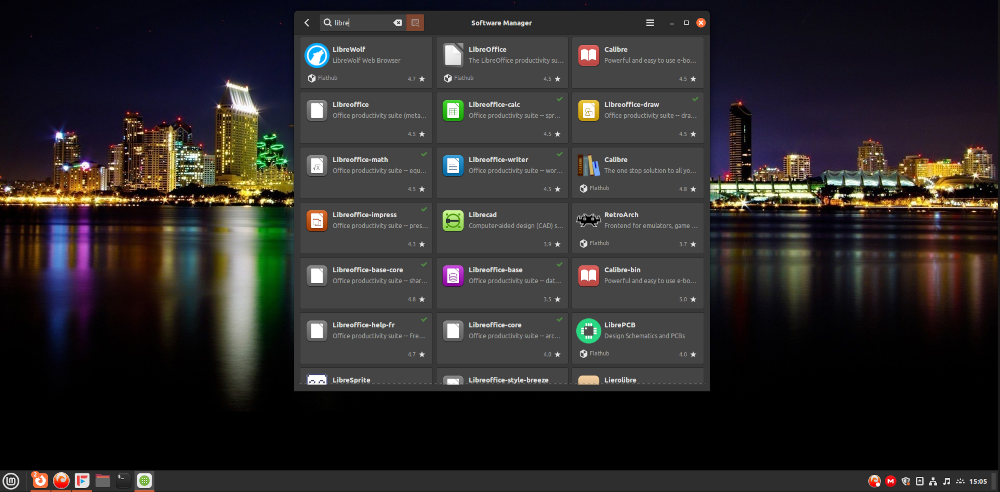Tell us what commands you ran exactly and what the terminal responded.
(Do this in general when asking for Linux help btw. that makes it a bit easier to give a useful reply straight away.)
Tell us what commands you ran exactly and what the terminal responded.
(Do this in general when asking for Linux help btw. that makes it a bit easier to give a useful reply straight away.)
As a brand new user, you don't need to use any commands to install librewolf. Open "Software Manager", type "libre" in the search bar and install the first result.

I tried that but it seems to get stuck on the loading screen saying Generating cache, one moment please I’m not sure if it’s just slow or if something is wrong
I take that back I don’t know what I done to fix it but it’s working now
It may be worth checking to ensure that your repo mirrors are set to the best ones for your location. This can be done via the update manager.
You either added their apt repo and installed it via apt, or you installed the Flatpak
Sometimes, the repos(machines where the software is stored) has a hiccup that causes installs to stall and fail. When that happens, I usually give it another try in an hour or so before bothering to troubleshoot. It pretty much always resolves itself when this happens.
Install it from your Software Center. It's really easy and need no command at all.
I believe I’ve solved the issue thank you all for the help!
If you have the time please tell us how you solved it, it might be helpful for other people in the future with the same problem.
Changed methods I used the software manager instead
Just use the Flatpak, it makes everything much easier:
https://flathub.org/apps/io.gitlab.librewolf-community
You have 3 solutions :
sudo apt update && sudo apt install -y wget gnupg lsb-release apt-transport-https ca-certificates
distro=$(if echo " una bookworm vanessa focal jammy bullseye vera uma " | grep -q " $(lsb_release -sc) "; then lsb_release -sc; else echo focal; fi)
wget -O- https://deb.librewolf.net/keyring.gpg | sudo gpg --dearmor -o /usr/share/keyrings/librewolf.gpg
sudo tee /etc/apt/sources.list.d/librewolf.sources << EOF > /dev/null Types: deb URIs: https://deb.librewolf.net Suites: $distro Components: main Architectures: amd64 Signed-By: /usr/share/keyrings/librewolf.gpg EOF
sudo apt update
sudo apt install librewolf -y
USE THE DISTRO APP STORE
USE FLATPAK (just enter this command into the terminal)
flatpak install flathub io.gitlab.librewolf-communitym
Step 1:
Go to software
Step 2: search librewolf
Step 3: install it
Sometimes the CLI is more complicated
One thing that could help is showing what is going wrong. Do just the icon does not appear? Do some error show up?
But regardless, I see that Librewolf is not packaged in Debian official software repositories (online storage a software packages are downloaded from), so they ask you to add their own repository manually, which for APT case (package manager in Linux Mint) is an overwhelming amount of code to type to say at least.
You say you are a new user, so I can highly recommend that if something is not officially available through simple apt install to try Flatpak. Official guide: https://flathub.org/setup/Debian, TLDR:
sudo apt install flatpak # Installs flatpak to your system
flatpak remote-add --if-not-exists flathub https://dl.flathub.org/repo/flathub.flatpakrepo # Adds Flathub, the biggest store for flatpaks
Once it's there:
flatpak install librewolf
Someone using Linux for years might know where stuff on system is placed and not fear not knowing what a command do and how to undo it. But if you don't know what is happening, better to stick to distribution provided sources. Otherwise the equivalent would be like typing some commands in Windows to change registry keys :). I think Librewolf should recommend Flatpak by default instead.
Sorry if this is too much info, just tried to explain things a little more than usual.
linux mint comes with flatpak
Websites can be vague, or outdated. Is there any error from running the command?
Sudo apt install librewolf
Sudo apt install flatpak
Flatpak install librewolf
If that doesn't work then I recommend you try just installing it from your package manager of choice
But if that doesn't work then I don't know what else I can do for you mate. Firefox broke on my version of Linux mint just uninstalled it and used unchromeium Linux and it's subsequent distros can be quite weird at times
It is only available as a flatpak
Or from source
That's a pain
You would need to add the flathub repo. But thats already done by default on Mint.
From Wikipedia, the free encyclopedia
Linux is a family of open source Unix-like operating systems based on the Linux kernel, an operating system kernel first released on September 17, 1991 by Linus Torvalds. Linux is typically packaged in a Linux distribution (or distro for short).
Distributions include the Linux kernel and supporting system software and libraries, many of which are provided by the GNU Project. Many Linux distributions use the word "Linux" in their name, but the Free Software Foundation uses the name GNU/Linux to emphasize the importance of GNU software, causing some controversy.
Community icon by Alpár-Etele Méder, licensed under CC BY 3.0